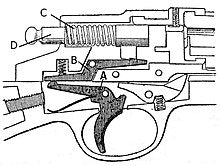
Systemic and domestic violence
Share
To paraphrase Noam Chomsky: 'you don't need to pull the trigger of a gun for it to be effective. The threat of the gun is enough to get people to do what you want'
There was a lot of talk about how we should reduce domestic violence on International Women's Day this year. Here are two current government plans.
National Plan to End Domestic Violence Against Women and Children 2022 - 2032
We must address domestic violence deeply and immediately. However, I worry that the solutions that are being talked about don't include some of the foundational issues.
There is some acknowledgment and exploration of the 'underlying issues' in the plans linked above. But they do not seem to acknowledge or explore what might be one of the most important factors.
Our domestic homes are fractals and reflections of our communities and societies. We live in a country and in towns where we are constantly threatened with the violence of the state. If we do not abide by the rules (the law) we will feel the consequences enforced by the state (fines, police brutality, jail time).
People are literally paid to drive and walk around our communities with guns (police) to ensure the state's rules are adhered to. These rules were not devised and agreed to by everyone through some kind of collaborative or participatory process. These rules were, and continue to be, written by mainly wealth white males who control the government and legal systems.
(Enforcement is also done by people paid to sit and bang hammers (judges). They are the ones interpreting the complex system of laws and upholding the authority of the law through the courts. Of course, the police are still there to escort you (intimidate you) in and out of the courts.)
There is some acknowledgment in the National and State Plans above that an underlying issue is the overrepresentation of men in positions of power throughout society. And maybe that is a more foundational issue than the constant threat of violence.
If women were equally represented or overrepresented in positions of power, perhaps we would not have a system of violence - the military and policing complex - to threaten us to conform to laws that benefit people in power. Particularly property owning people. So maybe patriarchy is still the biggest issue. But I feel we should look at and address the use of violence, and the use of the threat of violence, by the state. I believe it leads directly to violence in the home. As does the use and threat of violence by the state abroad through the military (It is easy to see how people might think, consciously or unconsciously, 'our government threatens other governments with violence to get what it wants, why shouldn't I do that?').
If society is predicated on violence. For example, 'we will shoot you, beat you, imprison you if you don't do what we say and want.' Why wouldn't people, mainly men, think that they can use violence to get people, mainly women and children, to do what they say and want? For example, 'I will beat you, lock you up, and take away your money if you don't do what I want.'
All forms of violence are wrong. What individuals using violence are doing is wrong, and they should be stopped. They also are reflecting what they feel society is doing to them. People feel powerless in a society controlled by the threat of violence. Add to that the threat of starvation and homelessness if you don't work in the 'job market', and you have the equivalent of coercive control at a societal level.
If we want to stop domestic violence, do we need to stop state violence?
Maybe we need to rebuild our communities and societies from the ground up. We could co-create community principles and norms (not laws) that keep people accountable and in respectful relationship to one another. We could have much safer communities without laws and police. Just like we had on these lands before the colonisers arrived.
Everywhere laws, judicial systems, and police are created to protect the powerful, the wealthy, and the property owners. Our society currently values the needs of property owners (mainly men) over the safety of people who are victims of domestic violence (mainly women and children). Until we come to face this and address this, all the talk and efforts to address domestic violence might be in vain and misguided at best and purposefully manipulative at worst.
What do you think? What else is important to consider here?